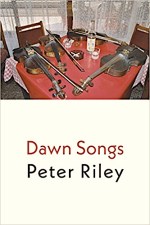By PETER RILEY.
.
SMOOTH HILLSIDES AND dunes in the desert resemble the slopes and curves of the human body (“flank” … “haunch”), showing the sheen of human skin. The desert at dawn, scattered small lights: facets of fractured rock, grains of sand, insects… small lights moving as if very far away. The intimate presence of the Earth breathing in your ear.
♦
AT NIGHT A point of darkness, a black dot; at dawn a small flame, blue and white streaks, begins to unfold, yellow to red. The need to protect this very small flame, to house it in a globe of thin glass, with access to air: a scientific instrument measuring what we are: the eye staring into the eye and seeing landscapes there, of great beauty, inaccessible. The star over the Judean desert, its light entering a shrine.
♦
AND SOMEONE ARRIVES from very far away, from nowhere and from absence, exactly on time, the doors swing on their hinges. “A sort of luminous saturation” enters the room from the direction of the sea and the world is articulated in its immediacy, by exactly what the hand touches when it reaches out: a cup, a knife, a shoulder, a fossil ammonite, “the great leaf of day”. Two people turn towards each other, “an undelayable hunger for birth”. Sea and blood, light and shadow, hinged onto each other and opening, in Patmos.
♦
THE HOUSE BY the sea. Someone lights a match, before dawn, a fisherman sets out in his small boat on the striated meniscus of deep blue ink, an unexpected dawn wind sweeps over the stone fields raising a cloud of pale dust in which a voice thinks: “The thunder” (the fire, the strife, the Logos) “echoes everything”. The strife that coheres. “I can hear the song”, the love trying to heal the strife and the eyes of the small fish in the mountain stream, always searching.
♦
THROUGH MUD, THROUGH histories of war (“…having suddenly lost our ancestors…”) seeking a page of ideograms, a new ikonostasis of peace and virtú sinking into the sea, looking up at the bird in the tree. An ancient pine in a Chinese ink drawing, an embroidery of discrete signs under which the wearied traveller sits, and listens to the stream. The chatter of small birds in a small white courtyard in Sidi-bou-Said, two long-haired Siamese cats half-asleep. The slow forgetting of histories and noticing what comes from further away, beyond the sea, over the mountains, beyond memory — not a deity but a substance, to be inhabited. Two fiddlers and a cimbalom in a distant village in the hills, Gyergyóalfalu, the sound carried in the breeze fading over the plain. A dance in which everyone joins — n/um — the power to heal.
—2005
(punctuated 2021)
♦
Lorand Gaspar, 1925-2019, was a Francophone poet, writer of prose, photographer, and surgeon, born in Transylvania (Gyergyóalfalu), lived latterly in Tunisia (Sidi bou Said) and had a house on the Greek island of Patmos. ‘Leaving Sidi bou Said’ by Lorand Gaspar, with photographs by the author, was published in The Fortnightly Review here.
♦

 Peter Riley, the poetry editor of The Fortnightly Review‘s New Series, is a former editor of Collection, and the author of fifteen books of poetry (including The Glacial Stairway [Carcanet, 2011]) – and some of prose. He lives in Yorkshire and is the recipient of a 2012 Cholmondeley Award for poetry.
Peter Riley, the poetry editor of The Fortnightly Review‘s New Series, is a former editor of Collection, and the author of fifteen books of poetry (including The Glacial Stairway [Carcanet, 2011]) – and some of prose. He lives in Yorkshire and is the recipient of a 2012 Cholmondeley Award for poetry.
Peter Riley’s Collected Poems, containing work from 1962 to 2017, was published in two volumes by Shearsman in 2018, followed by Truth, Justice, and the Companionship of Owls from Longbarrow Press in 2019. An earlier book, Due North, was shortlisted for the Forward Prize in 2015. A collection of his ‘Poetry Notes’ columns has been collected in The Fortnightly Reviews: Poetry Notes 2012-2014, and published in 2015 by Odd Volumes, our imprint. An archive of his Fortnightly columns is here.






















Post a Comment